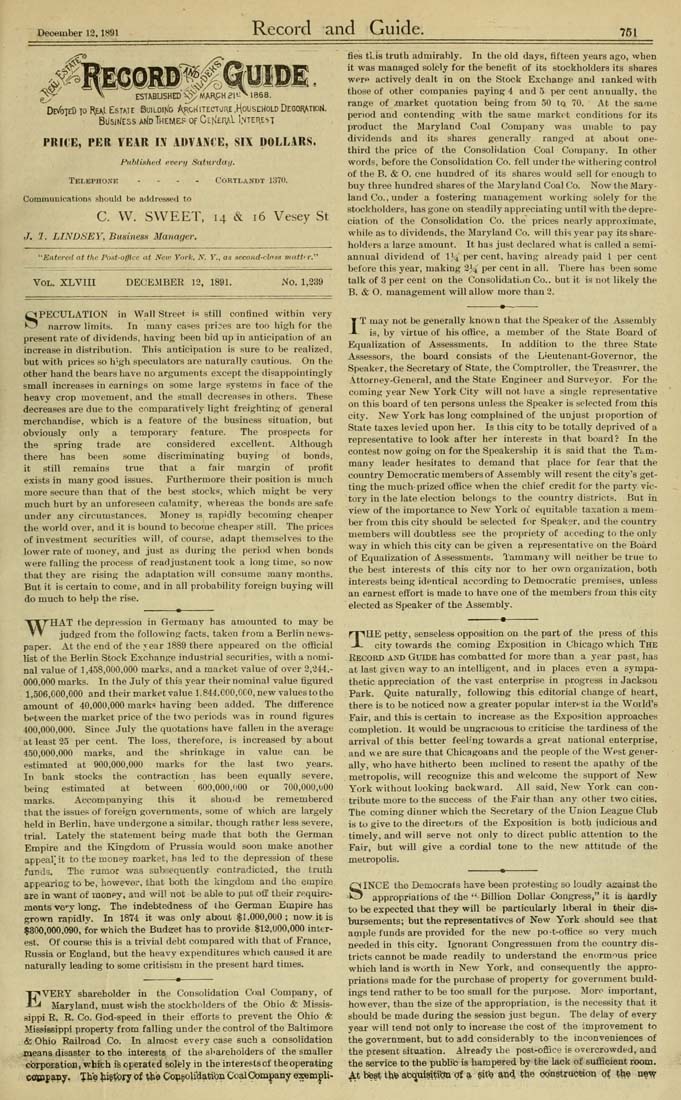Columbia University Libraries Digital Collections: The Real Estate Record
Use your browser's Print function to print these pages.
Real estate record and builders' guide: v. 48, no. 1239: December 12, 1891

Text version:
Please note: this text may be incomplete. For more information about this OCR, view About OCR text.
Oeoember 12,1891 Record and Guide. 761 mm ^ \ ESTABUSHED'^ WARPH ai'-^ 1868. Di/oteO to R^l EsTME BuiLDiKc Asioi^itectoi^e .Household DEQOfViTioiL BUsiiiEss Alto Themes of CtfJEiv.l I.ntei^est PRIOE, PEa FEAR IN ADVA!V€E, SIX DOLLARS. Published every Saturday. Telephone . - . . Cortlandt 1370. Communications should be addressed to C. W. SWEET, 14 & i6 Vesey St J. 1. LINDSEY, Business Manager. "Entered at the Post-offlce at New York. N. Y., as second-clnss matt.r." Vol. XLVIII DECEMBER 12, 1891. No. 1,239 SPECULATION in Wall Street is still confined within very narrow limits. In many caies prices are too high for the present rate of dividends, having been bid up in anticipation of an increase in distribution. This anticipation is sure to be realized, but with prices so h'gh speculators are naturally cautious. On the other hand the bears have no arguments except the disappointingly small increases in earnings on some large systems in face of the heavy crop movement, and the amall decreases in others. These decreases are due to the comparatively light freighting of general merchandise, which is a feature of the business situation, but obviously only a temporary feature. The prospects for the spring trade are considered excellent. Although there has been some discriminating buying ot bonds, it still remains true that a fair margin of proflt exists in many good issues. Furthermore their position is much more secure than that of the best stocks, which might be very much hurt by an unforeseen calamity, whereas the bonds are safe under any circumstances. Money is. rapidly becoming cheaper the world over, and it Is bound to becoine cheaper still. The prices of investment securities will, of course, adapt themselves to the lower rate of money, and just as during the period when bonds were falling the process of readjustment took a long time, so now that they are rising the adaptation will consume many months. But it is certain to come, and in all probability foreign buying will do much to help tbe rise. WHAT the depression in Germany has amounted to may be judged fiom the following facts, taken from a Berlin news¬ paper. At the end of the rear 1889 there appeared on the official list of the Berlin Stock Exchange industrial securities, with a nomi¬ nal value of 1,458,000,000 marks, and a market value of over 2,344,- 000.000 marks. In the July of this year their nominal value figured 1,506,000,000 andlheirmarketvaluel.844.C00,0C0,newvaluestothe amount of 40.000,000 marks having been added. The difference between the market price of the two periods was in round figures 400,000,000. Since July the quotations have fallen in the average at least 25 per cent. The loss, therefore, is increased by about 450,000,000 marks, and the shrinkage in value can be estimated at 900,000,000 marks for the last two years. In bank stocks the contraction has been equally severe, being estimated at between '600,000,000 or 700,000,000 marks. Accompanying this it shouid be remembered that the issues of foreign governments, some of which are largely held In Berlin, have undergone a similar, though rather less severe, trial. Lately the statement being made that both the German Empire and the Kingdom of Prussia would soon make another appeal; it to the money market, has led to the depression of these funds. The rumor was subsequently contradicted, the trutb appearing to be, however, that both the kingdom and the empire are in want of money, and will not be able to put off their require¬ ments ve'y long. The indebtedness of the German Btnpire has grown rapidly. In 18?4 it was only about $1,000,000; now it is $800,000,090, for wbich the Budget has to provide $12,000,000 inter¬ est. Of course this is a trivial debt compared with that of France, Bussia or England, but the heavy expenditures which caused it are naturally leading to some critisism in the present hard times. EVERY shareholder in the Consolidation Coal Company, of Maryland, must wish the stockholders of the Ohio & Missis¬ sippi R. R. Co. God-speed in their efforts to prevent the Ohio & Mississippi property from falling under the control of tho Baltimore & Ohio Railroad Co. In alraost every case such a consolidation .means diea^tjcc tpthe interests of the sl'areholders of the smaller iBi:^p